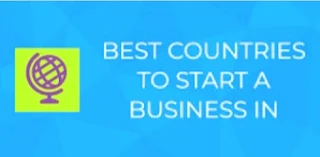The best country to start a business in Europe sides
The 6 best country to start a business in Europe sides
Creating a business position
The position of Doing Business is a value attributed to almost every country in the world by the World Bank organization. The World Bank looks at a number of factors when deciding which is the best place to start a business, including the legal and structural barriers to starting a business. A bad business position is not the end, especially if the problem is about starting a business, as a construction agent can direct you to. However, it is something to consider separately from other factors.
The interesting thing about Doing Business standards is that they do not always fit in with the world's largest economies, or have a highly respected global reputation. Instead, the standards look at how easy it is to start and run a business in these countries. Instead of making your mind over, the Doing Business report is a great source for a variety of places to start a business quickly and easily - ready to test the waters before a major European expansion.
The most advanced countries in Europe are:
1. Denmark
Denmark is considered to be the world leader in cross-border trade, with simple regulation and a good position in the heart of Europe. It also ranks among the 4th in the world with building permits, 6th in debt settlement, 9th in taxation and 11 in property registration - and is often cited as one of the world's leading living standards.
2. Georgia
Georgia is ranked as the 2nd easiest country in the world to start a business, and the 2nd best for protecting small investors. It sets out 4th property registration and 8th for contract enforcement. With European values and cultures on the Asian border, and trade between the continents is well established
3. Northern Macedonia
Perhaps the most impressive entry of the top five, North Macedonia has made great strides in attracting investment, and is now a good place for business expansion. It is located on the Balkan island, a newly renovated country for the seventh time to protect small investors, 12 for access to credit and 13 for dealing with building permits. It remains a very poor country, but this can benefit businesses with a dependent budget.
Talent and infrastructure
While it is possible to hire talent in your home country and come with them, it is usually not advisable. By renting a place, you get more specific information in your area, which helps to avoid unwanted mistakes through translation or false traditions. It will also help to make you like local people, and make you feel like a local business.
Therefore, the discovery of talent in your European country is important. While all EU countries benefit from the free flow of European talent, some countries boast more local talent than others. As well as the size and reputation of universities, it may be appropriate to look at various industrial institutions, where talent is often integrated.
The best country to start a business in Europe is FranceFrance
France is increasingly known as the home of technological innovation outside of Silicon Valley, and for good reason. Under aspiring President Emmanuel Macron - formerly the country's Digital Economics Minister - France continued to invest heavily in the construction of technology centers and the development of technical talent under the ‘La French Tech’ program.
France sends the largest non-American delegation each year to the well-known Consumer Electronics Show and now has many technology hubs across the country, with one of the world's best campuses at the Paris F. Station.
4 Ireland
IRELAND
In the mid-1990s to the early 2000s, the Irish economy flourished as never before. In fact, this rapid growth earned him the nickname: 'Celtic Tiger.'
While this growth slowed following the global economic downturn in 2008, Ireland came back on track, and is now among the best countries to start a small business.
The main reason for this return of the Irish government’s attitude towards business. Their measures, such as the company's low tax rate (12.5%), develop a hospital climate that is too extreme for businesses of any size. Many big-name tech firms (such as Google, Twitter, Facebook and LinkedIn) have set up their European headquarters here for this reason.
But the Irish government has also allocated significant public resources to fund any type of new business.
Bulgaria
5 BULGARIA
With the former Soviet Union neglected, Bulgaria has become a center of global business. According to the World Bank, it only takes 23 days to start a new business.
The average administrative costs are between € 500 and € 800, and the minimum amount required by the bank to set up a company with a limited liability is 1 € symbolic. So legally you have nothing in your bank account and you are still getting started (although this is probably not advisable).
For more information on starting a business in Bulgaria, check out the Invest Bulgaria Agency.
6 The Netherlands
AMSTERDAM 1 1
Holland is generally friendly to businessmen, and Amsterdam in particular has much to offer.
For one thing, there is a precedent for history: Amsterdam was founded on a bustling trade.
The Dutch government considers it a tradition to promote good business practices. And while the tax rate is high (usually 25%, depending on your brackets), generous services leave many citizens happy with the trade.
Their government also provides adequate social support for entrepreneurs, which can be found here, including this step-by-step guide to starting a business in Amsterdam







Comments